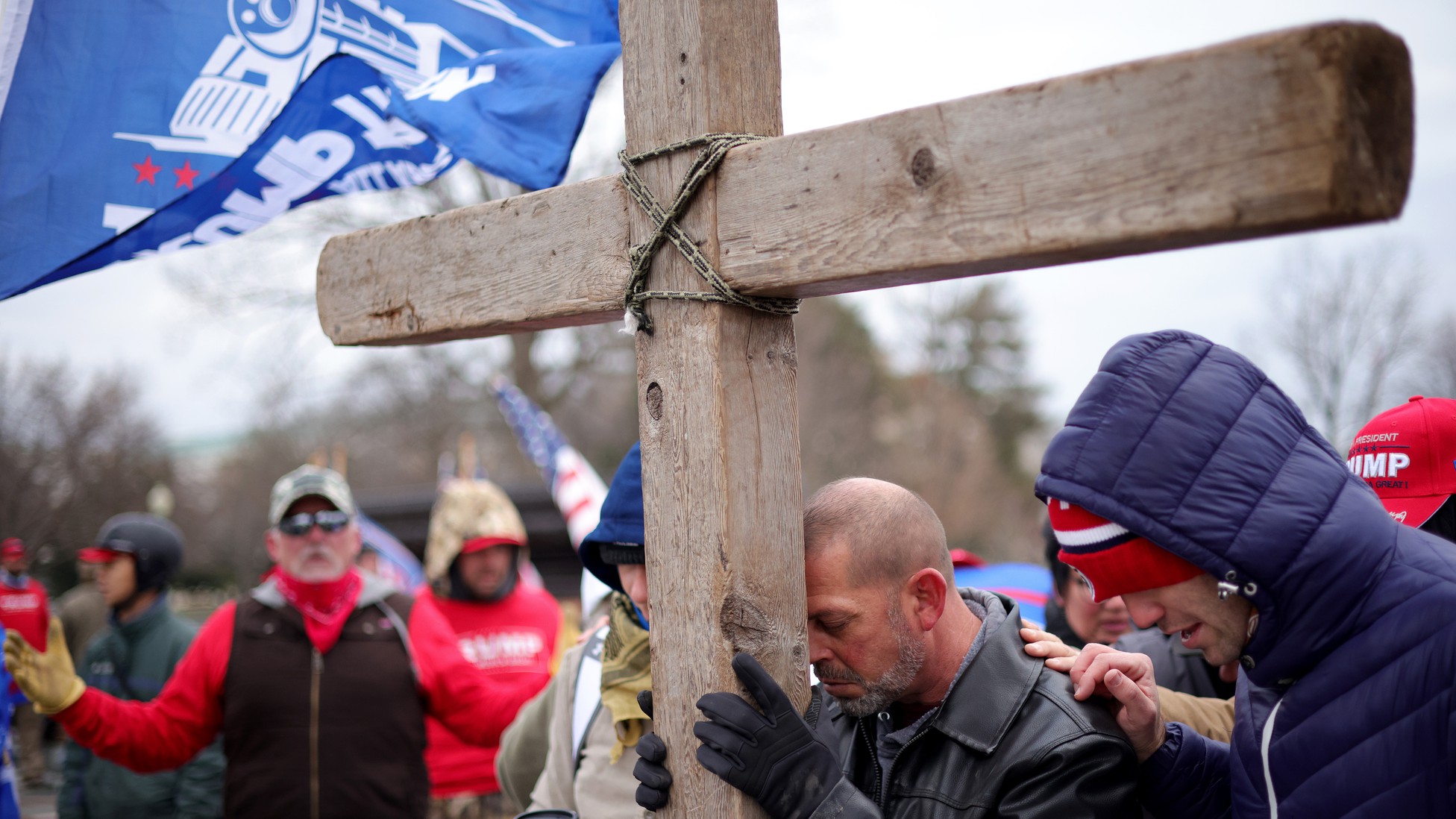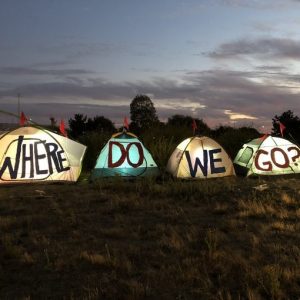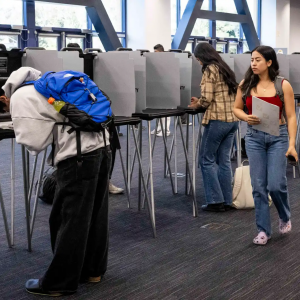On January 6, 2021, insurrectionists stormed the halls of the United States Capitol building. The video crews of newscasters at the scene captured the insurrectionist crowd, many of them wearing Trump merchandise and chanting far right slogans about the “stolen election.” Something else many of them were chanting: scripture.
The name of God was everywhere that day. Members of the mob carried flags and signs declaring “God, Guns & Guts Made America. Let’s Keep All Three.” and “Say Yes to Jesus!” Not too much earlier, the Jericho March, a gathering of Christians to “pray, march, fast, and rally for election integrity,” had been calling on God to “save the republic” during rallies in D.C. and at state capitols in the time between the election and the insurrection. On the national mall, someone yelled “Shout if you love Jesus!” and the crowd cheered. “Shout if you love Trump!” The crowd cheered even louder.
Evangelical Christians have been a powerful force in GOP politics for decades. However, faced with a nation that is transforming every single day, the group has found itself becoming older and whiter than the rest of the county. With their diminishing influence among the moral landscape of America that has rejected a lot of their views on topics such as abortion and same-sex marriage, many pastors and churchgoers are looking for more answers and finding them in conspiracy theories.
QAnon is a cult-ish conspiracy theory claiming that a military intelligence team is using online message boards such as 4chan and 8kun to leak classified information of the deep state, and that they are doing this by using codes, riddles, and pictures that are meant to be interpreted by followers. Further, the theory holds that the world is controlled by Satan-worshipping, cannibalistic, Democratic pedophiles who former President Donald Trump is fighting a secret war with.
However, it is known that QAnon believers acknowledge more than just these central ideas, and that the movement can contain every single theory you’ve ever heard, and some you may have never heard of. These can range from the belief that the Earth is flat, certain celebrities are shape-shifting reptiles from space, or that vaccines are actually mechanisms for the government to put tracking chips into people’s bodies. They all fit into the “grand unified theory of Q.”
The beginnings of the theory can be dated back to October 28, 2017, when a user named “Q Clearance Patriot” first appeared on 4chan by posting a thread called “The Calm Before the Storm,” which was a nod to a cryptic description of former President Donald Trump’s gathering with military leaders. This “Storm” became a reference to an imminent moment in which thousands of alleged suspects would be arrested, imprisoned, and executed for their heinous crimes.
It’s important to note that about a week after its first post, Q was already quoting scripture. “The LORD is my shepherd. I lack nothing,” it wrote on 4chan. The line was from Psalm 23, a well-known verse to give hope to Christians during challenging moments. As it would happen, a concerning number of Christians would end up believing in Q.
A conservative think tank, The American Enterprise Institute’s Survey Center on American Life’s January 2021 American Perspectives Survey asked a random sample of over 2,000 Americans to rate the accuracy of a series of statements. One of these statements includes the core belief of QAnon: “Donald Trump has been secretly fighting a group of child sex traffickers that include prominent Democrats and Hollywood elites.” Of the responses that the statement was “completely” or “mostly” accurate, 27% of them were white evangelical Christians. These evangelical Christians make up about a fourth of the United States population, so they’re at least a little overrepresented in the body of QAnon, meaning that there is an overlap between followers of Q and evangelicals.
Surveys have also shown a correlation between Christian nationalism and thinking conspiratorially, with a specific belief in QAnon, which is something that members and leaders of the church have been warning about for months. A poll released this January from the Nashville-based Lifeway Research, a branch of the Southern Baptist Convention, indicated that 49% of Protestant pastors have often heard members of their congregation repeating conspiracy theories they have heard about national events. In response to this ongoing trend, pastors, thinkers, and leaders of faith published an open letter condemning “the rise of violent acts by radical extremists using the name of Christ. The letter, titled ”Say No to Christian Nationalism,” has received over 500 signatures from leading members of the church.
While there’s still research being conducted on the demographics of QAnon believers, looking at the other beliefs and identities of evangelicals can help explain why they might be more susceptible to falling down the rabbit hole. According to the Pew Research Center’s 2014 Religious Landscape Study, 56% of evangelicals identify as Republicans. Republicans are also significantly less trustful of the news media, meaning that the fact-checking and debunking of these conspiracy theories aren’t very convincing.
“I’m actually not surprised that evangelicals are more likely to believe those kinds of things,” said Samuel Perry, a professor of sociology at the University of Oklahoma. “Evangelicals are not socially isolated, but they are informationally isolated. The narrative of QAnon, of Donald Trump as this lone warrior who nobody understands and nobody believes but who is fighting the good fight, I think they identify with that. They feel themselves misunderstood and victimized and that they are fighting the good fight that nobody recognizes.”
Perhaps the most important correlation between the world of evangelical Christians and believers of Q is one that is difficult to capture and back up with quantifiable evidence but easy to see the connection. That is that because of the multitude of Q’s failed prophecies and predictions for outcomes that have never come, one would need to hold onto these beliefs in spite of the wave of disappointment. This requires something that evangelicals have a lot of: faith.
“People of faith believe there is a divine plan — that there are forces of good and forces of evil at work in the world,” said Ed Stetzer, an evangelical pastor and executive director of the Wheaton College Billy Graham Center. “QAnon is a train that runs on the tracks that religion has already put in place.”
James Kendall, a senior pastor at Grace Community Church in Madera, California is one of many church leaders attempting to fight against the spread of conspiracy theories in congregations, and has noted the difficulties of competing with the online world for their attention. “I get an hour with people every week, versus the 167 hours that they have out on their own to do other things.”
This highlights the most dangerous aspect of QAnon— its ability to effectively spread an incredibly large amount of false information on internet platforms such as Facebook, Twitter, and YouTube. The COVID-19 pandemic has played a particular role in the popularization of QAnon. Facebook data shows that since the beginning of 2020 QAnon membership has grown by 581 percent, especially in March when much of the United States went on lockdown as a result of the government’s strategy to contain the virus. Alex Kaplan, a social media researcher, noted that 2020 was the year “QAnon became all of our problem,” as the movement gained more momentum by spreading COVID-related conspiracy theories and disinformation. That same year, 98 U.S. congressional candidates showed their support for QAnon, with 2 of them actually winning seats.
James Kendall has seen this impact on his Facebook feed. Members of his evangelical church congregation were posting that in spite of Joe Biden being declared the winner of the 2020 presidential election, his inauguration would somehow not happen as planned and Donald Trump would become the president again. Kendall has stated that his attempts to have conversations with his church members about Q have proved inconsequential. “A lot of times they’re not really open to hearing my side of things or explanations,” he says. “The Bible tells us, there’s always going to be false teachers in the church,” Kendall said. “My job as a pastor is to protect the sheep from the wolves, and to not just point them to the truth, but to warn them when these false teachers come in and try to take people away.”
In the end, QAnon is a new, false religion— but it’s an especially dangerous and destructive one. It mimics some of the belief and faithful elements of Christianity, but it’s ultimately just a cheap imitation. “Beware of false prophets,” the Bible warns, “which come to you in sheep’s clothing, but inwardly they are ravening wolves.”
Sometimes these wolves believe in conspiracy theories.
Featured Image Source: The Atlantic.






Comments are closed.